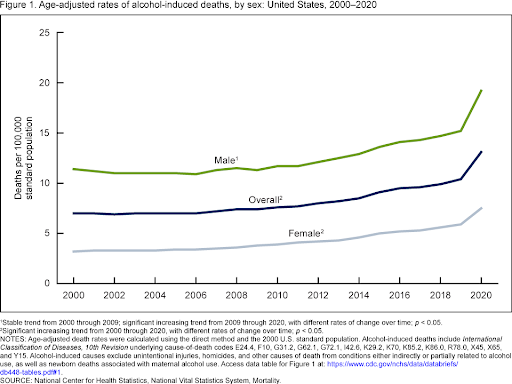
Alcohol Withdrawal Syndrome
Alcohol Detox, Medically Supervised from the Comfort of your Home
Effective Treatment Options for a Life Beyond Alcohol Addiction
Dr. Overton's Outpatient Treatment for Alcohol Withdrawal Syndrome (AWS), a.k.a. Alcohol Detox
Introducing Dr. Overton's outpatient treatment program for Alcohol Withdrawal Syndrome (AWS). Designed for individuals with Alcohol Use Disorder (AUD) seeking comfort and convenience, this program provides a safe and effective alternative to traditional inpatient settings for Alcohol Detox.
Did you know?
-
385 Americans die from alcohol every day.
-
60% of Americans increased their alcohol consumption during the COVID lockdown (SAMHS 2022) & (NCDAS).
-
Binge drinking in women has been on the rise for the last 25 years.
United States, 2000-2020
Age-Adjusted Rates of Alcohol-Induced Deaths by Sex

Source: National Center for Health Statistics, National Vital Statistics System, Mortality.

Reclaim Your Life - Take the first step
Choose Dr. Overton for comprehensive, compassionate, and effective addiction treatment. We’re here to guide you on your path to recovery. Contact us today to schedule an appointment and take the first step towards a brighter, healthier future.Benefits of Outpatient Treatment for AWS:
- Comfort of Home: Many patients prefer the comfort and familiarity of being at home during treatment.
- Reduction of Stigma: Outpatient treatment can alleviate the stigma of hospitalization for an AUD diagnosis.
- Cost-Effective: From a financial perspective, outpatient management is more cost-effective than inpatient treatment.


Criteria for Outpatient Alcohol Detox Treatment for AWS
Before considering outpatient treatment, Dr. Overton will evaluate the following:
- Support System: Does the patient have a supportive environment?
- Symptom Severity: Current symptoms should be mild to moderate. Those with severe symptoms may not be suitable candidates.
- Monitoring: Patients should have the capability to be monitored frequently, especially through telemedicine.
- Comorbidities: The presence of other severe conditions like liver or kidney diseases will be considered.
- Pregnancy: The patient’s pregnancy status.
- History: Any history of severe alcohol withdrawal.
- Protocol Adherence: Ability to follow a simple protocol, including tapering and monitoring instructions provided by Dr. Overton.
